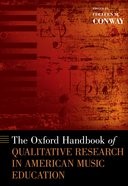 The Oxford Handbook of Qualitative Research in American Music Education
The Oxford Handbook of Qualitative Research in American Music Education
Contents
-
-
-
-
-
-
-
-
-
-
-
-
-
-
-
-
23.1 Introduction 23.1 Introduction
-
23.2 Choir is a Safe Place 23.2 Choir is a Safe Place
-
23.2.1 Less Safe Places 23.2.1 Less Safe Places
-
-
23.3 Perceptions of Participation in Choir 23.3 Perceptions of Participation in Choir
-
23.3.1 High School Participation in Choir 23.3.1 High School Participation in Choir
-
23.3.2 Middle Level Participation 23.3.2 Middle Level Participation
-
23.3.3 Participation with the Music 23.3.3 Participation with the Music
-
23.3.4 Teacher Participation in the Choral Experience 23.3.4 Teacher Participation in the Choral Experience
-
-
23.4 Moving Forward 23.4 Moving Forward
-
References References
-
-
-
-
-
-
-
-
-
-
-
-
23 Qualitative Choral Music Research
Get accessBridget Sweet is Associate Professor of Music Education at the University of Illinois in Urbana-Champaign, where she teaches choral methods and literature, middle-level music education pedagogy, graduate research, and a course focused on the development of healthy practices for all musicians. Dr. Sweet has worked extensively with adolescent singers as a teacher, clinician, and conductor. She wrote the books Growing Musicians: Teaching Music in Middle School and Beyond (2016) and Thinking Outside the Voice Box: Adolescent Voice Change in Music Education (2019). Her research interests include middle-level choral music education, female and male adolescent voice change, empowering music educators, health and wellness, and intersections of diversity and the music classroom. She is earning licensure to be a Body Mapping Instructor through the Association for Body Mapping Education.
-
Published:02 June 2014
Cite
Abstract
This chapter provides a comprehensive review of qualitative choral music education research conducted in the United States. Research revealed that safe spaces are valuable to choral teachers and students, choir members, and directors. In addition, the choral environment and qualities of the teacher have the power to positively and/or negatively sway choral participation, regardless of a chorister’s stage of life. From this review it is clear that participation in choral music can be a multi-faceted experience, as can benefits received from participation. It was found that no qualitative research has been specifically focused on female adolescent choir students and that little qualitative research has been conducted with former choral students or non-singers.
Sign in
Personal account
- Sign in with email/username & password
- Get email alerts
- Save searches
- Purchase content
- Activate your purchase/trial code
- Add your ORCID iD
Purchase
Our books are available by subscription or purchase to libraries and institutions.
Purchasing information| Month: | Total Views: |
|---|---|
| August 2023 | 2 |
| September 2023 | 4 |
| October 2023 | 2 |
| November 2023 | 3 |
| December 2023 | 1 |
| January 2024 | 2 |
| March 2024 | 3 |
| April 2024 | 12 |
| May 2024 | 2 |
| July 2024 | 1 |
| August 2024 | 1 |
| September 2024 | 1 |
| October 2024 | 7 |
| November 2024 | 1 |
| December 2024 | 2 |
| February 2025 | 6 |
| March 2025 | 1 |
| April 2025 | 3 |

Get help with access
Institutional access
Access to content on Oxford Academic is often provided through institutional subscriptions and purchases. If you are a member of an institution with an active account, you may be able to access content in one of the following ways:
IP based access
Typically, access is provided across an institutional network to a range of IP addresses. This authentication occurs automatically, and it is not possible to sign out of an IP authenticated account.
Sign in through your institution
Choose this option to get remote access when outside your institution. Shibboleth/Open Athens technology is used to provide single sign-on between your institution’s website and Oxford Academic.
If your institution is not listed or you cannot sign in to your institution’s website, please contact your librarian or administrator.
Sign in with a library card
Enter your library card number to sign in. If you cannot sign in, please contact your librarian.
Society Members
Society member access to a journal is achieved in one of the following ways:
Sign in through society site
Many societies offer single sign-on between the society website and Oxford Academic. If you see ‘Sign in through society site’ in the sign in pane within a journal:
If you do not have a society account or have forgotten your username or password, please contact your society.
Sign in using a personal account
Some societies use Oxford Academic personal accounts to provide access to their members. See below.
Personal account
A personal account can be used to get email alerts, save searches, purchase content, and activate subscriptions.
Some societies use Oxford Academic personal accounts to provide access to their members.
Viewing your signed in accounts
Click the account icon in the top right to:
Signed in but can't access content
Oxford Academic is home to a wide variety of products. The institutional subscription may not cover the content that you are trying to access. If you believe you should have access to that content, please contact your librarian.
Institutional account management
For librarians and administrators, your personal account also provides access to institutional account management. Here you will find options to view and activate subscriptions, manage institutional settings and access options, access usage statistics, and more.